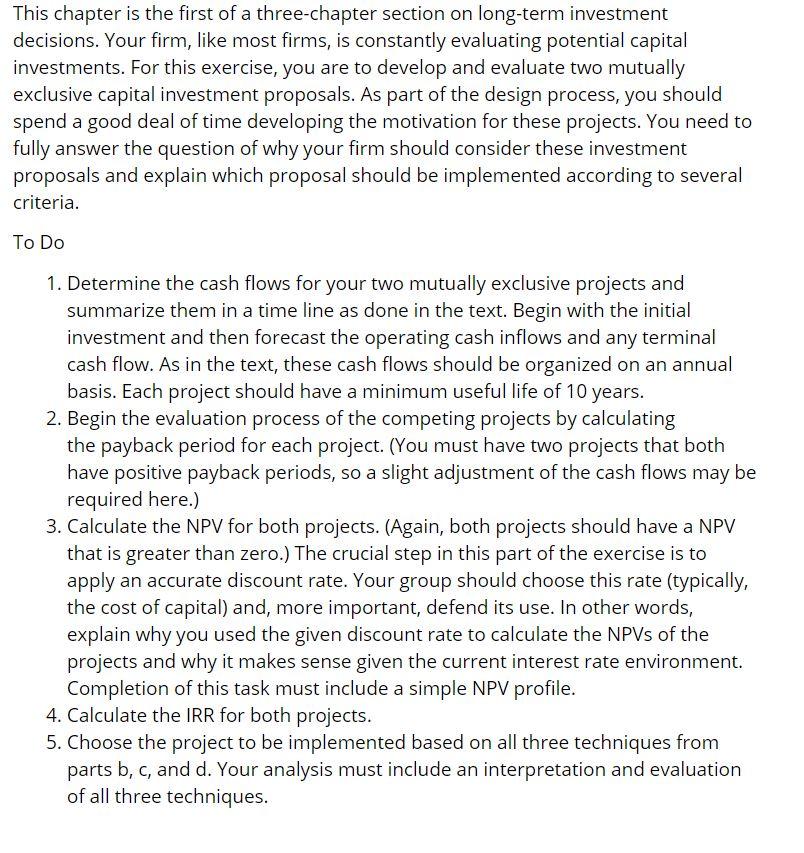Answered step by step
Verified Expert Solution
Question
1 Approved Answer
Project A= 150000 Project B= 300000 This chapter is the first of a three-chapter section on long-term investment decisions. Your firm, like most firms, is

Project A= 150000
Project B= 300000
This chapter is the first of a three-chapter section on long-term investment decisions. Your firm, like most firms, is constantly evaluating potential capital investments. For this exercise, you are to develop and evaluate two mutually exclusive capital investment proposals. As part of the design process, you should spend a good deal of time developing the motivation for these projects. You need to fully answer the question of why your firm should consider these investment proposals and explain which proposal should be implemented according to several criteria. To Do 1. Determine the cash flows for your two mutually exclusive projects and summarize them in a time line as done in the text. Begin with the initial investment and then forecast the operating cash inflows and any terminal cash flow. As in the text, these cash flows should be organized on an annual basis. Each project should have a minimum useful life of 10 years. 2. Begin the evaluation process of the competing projects by calculating the payback period for each project. (You must have two projects that both have positive payback periods, so a slight adjustment of the cash flows may be required here.) 3. Calculate the NPV for both projects. (Again, both projects should have a NPV that is greater than zero.) The crucial step in this part of the exercise is to apply an accurate discount rate. Your group should choose this rate (typically, the cost of capital) and, more important, defend its use. In other words, explain why you used the given discount rate to calculate the NPVs of the projects and why it makes sense given the current interest rate environment. Completion of this task must include a simple NPV profile. 4. Calculate the IRR for both projects. 5. Choose the project to be implemented based on all three techniques from parts b, c, and d. Your analysis must include an interpretation and evaluation of all three techniques. This chapter is the first of a three-chapter section on long-term investment decisions. Your firm, like most firms, is constantly evaluating potential capital investments. For this exercise, you are to develop and evaluate two mutually exclusive capital investment proposals. As part of the design process, you should spend a good deal of time developing the motivation for these projects. You need to fully answer the question of why your firm should consider these investment proposals and explain which proposal should be implemented according to several criteria. To Do 1. Determine the cash flows for your two mutually exclusive projects and summarize them in a time line as done in the text. Begin with the initial investment and then forecast the operating cash inflows and any terminal cash flow. As in the text, these cash flows should be organized on an annual basis. Each project should have a minimum useful life of 10 years. 2. Begin the evaluation process of the competing projects by calculating the payback period for each project. (You must have two projects that both have positive payback periods, so a slight adjustment of the cash flows may be required here.) 3. Calculate the NPV for both projects. (Again, both projects should have a NPV that is greater than zero.) The crucial step in this part of the exercise is to apply an accurate discount rate. Your group should choose this rate (typically, the cost of capital) and, more important, defend its use. In other words, explain why you used the given discount rate to calculate the NPVs of the projects and why it makes sense given the current interest rate environment. Completion of this task must include a simple NPV profile. 4. Calculate the IRR for both projects. 5. Choose the project to be implemented based on all three techniques from parts b, c, and d. Your analysis must include an interpretation and evaluation of all three techniquesStep by Step Solution
There are 3 Steps involved in it
Step: 1

Get Instant Access to Expert-Tailored Solutions
See step-by-step solutions with expert insights and AI powered tools for academic success
Step: 2

Step: 3

Ace Your Homework with AI
Get the answers you need in no time with our AI-driven, step-by-step assistance
Get Started


